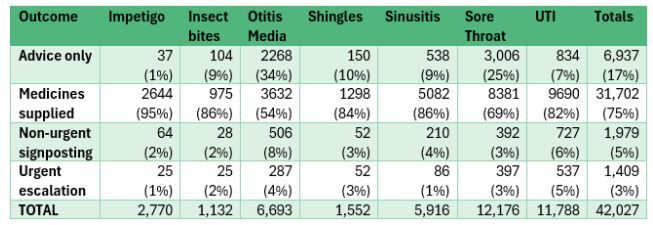Antibiotic prescribing concerns ‘so far unfounded’, say Pharmacy First leaders

Pharmacists are supplying antibiotics ‘only when absolutely necessary’ as part of Pharmacy First, so concerns that the scheme would drive antibiotic resistance are so far ‘unfounded’, trade leaders have said.
According to a report by the Company Chemists’ Association (CCA) – the trade association for large pharmacy operators across Great Britain – pharmacists are ‘closely following’ clinical guidance for antibiotic supply as part of Pharmacy First.
However, there are concerns the data did not cover all pharmacy antibiotic prescribing.
GP practices started referring patients to community pharmacies for seven common conditions – including sore throats, uncomplicated UTIs and ear infections – as the scheme launched at the end of January.
Under Pharmacy First, pharmacies can prescribe antibiotics, which led GPs to raise concerns surrounding antibiotic stewardship.
According to the CCA, in the first month of the service for 75% of eligible patients (31,702) a medicine was supplied, with rates varying across each condition.
Its report pointed to data showing that ‘pharmacists are closely following the guidance set out within the service’, highlighting that ‘90% of antibiotics supplied for sore throats were the “first line treatment”, penicillin’.
The report also showed:
- In the case of sinusitis, two treatment options are available: a high dose steroid nasal spray (for mild cases) or antibiotics (for more severe cases)- in 49% of sinusitis consultations recorded by the CCA pharmacies, the steroid nasal spray was supplied rather than antibiotics.
- In the first month, 95% (2,644) of impetigo consultations resulted in a medicines supply, whereas just 54% (3,632) of otitis media consultations did so.
- 69% of sore throat consultations resulted in a medicines supply
- over 90% of eligible patients received the care they needed, and their ‘episode of care’ was completed, through Pharmacy First
‘This shows pharmacists can manage patient expectations for antibiotic treatment and supply the most appropriate treatment option based on their symptoms,’ the CCA said.
It added: ‘Initial data shows that pharmacists are acting as stewards of antibiotic use, supplying antibiotics only when absolutely necessary, indicating that previous concerns that Pharmacy First would drive antibiotic resistance are so far unfounded.’
The CCA told Pulse it currently does not have sharable data on how many consultations in total resulted in antibiotic prescribing by pharmacists, but that this would form part of future analysis.
Professor Azeem Majeed, a GP and head of the Department of Primary Care and Public Health at Imperial College London, told Pulse that the report does not answer ‘key questions’ on the scheme, including how frequently pharmacists prescribe antibiotics compared to GPs.
He said: ‘It’s encouraging to see some review taking place of the Pharmacy First programme but the report does not answer some of the key questions; such as how the clinical effectiveness and cost-effectiveness of Pharmacy First compares with GP care.
‘For example, how frequently would pharmacists prescribe antibiotics compared with GPs? What is the cost of each Pharmacy First consultation compared with the cost of a GP consultation?
‘My view remains that we would have seen a bigger increase in primary care access if the funds for Pharmacy First had been allocated directly to general practices.’
At the end of last year, NHS England told GPs it will monitor the Pharmacy First service for any impact on AMR, following concerns from the profession around antibiotic stewardship.
And earlier this week, the Government’s new five-year plan on AMR stressed the importance of monitoring antibiotic prescribing under the Pharmacy First scheme.
The plan stated that ‘reducing unnecessary antimicrobial prescriptions is a core undertaking’ of the five-year plan, with the NHS set to provide GPs and other prescribers with tools to aid ‘decision support’ and ‘risk stratification’ – including AI.
Full CCA data on Pharmacy First consultations for the first month:

Source: The CCA
A version of this article was first published by Pulse’s sister title The Pharmacist
Pulse October survey
Take our July 2025 survey to potentially win £1.000 worth of tokens

Visit Pulse Reference for details on 140 symptoms, including easily searchable symptoms and categories, offering you a free platform to check symptoms and receive potential diagnoses during consultations.
Related Articles
READERS' COMMENTS [4]
Please note, only GPs are permitted to add comments to articles













“69% of sore throat consultations resulted in a medicines supply.”
Presumably not paracetamol which is my preferred suggestion for nearly all those with sore throats that I see.
The numbers suggest the opposite?
695 sore throat get medicines supplied and 86% in sinusitis. Surely the leader will know most of them are viral so the concerns are well founded.
These are nonsense figure with no comparison to cost and antibiotics use in GP service.Surely these leaders know it but are giving these figure to the gullible or really want o believe them like the politicians who are leading race to botom. Easy to says it takes few quid to develop new antibiotics after resistance develops
smoke and mirrors. 69% of sore throats requiring treatment is 68% higher than it should be. when this scheme ends, they will have created a demand for people with sore throats to expect a consultation and antibiotics like the lovely pharmacist used to give them. Penny wise and pound foolish comes to mind.